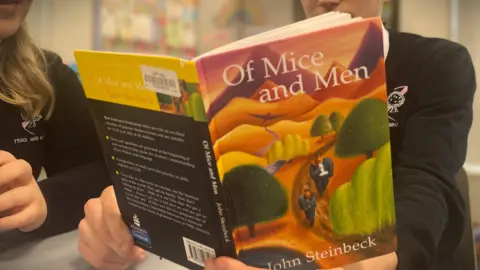Classic novel off GCSE list amid racial slurs fear
 BBC
BBCThe classic American novel Of Mice and Men will no longer be studied at GCSE in Wales from next September amid concerns about racism and the use of racial slurs.
John Steinbeck's text, set in the 1930s, has been a mainstay of the English literature qualification for many years.
Wales' Children's Commissioner Rocio Cifuentes welcomed the move and said having to discuss the book in class had been "psychologically and emotionally" harmful for some black children.
The WJEC exam board said it had selected "a wide range" of "appropriate and inclusive texts" as part of a new English language and literature GCSE.
Ms Cifuentes said many black children had "specifically mentioned this text and the harm that it caused them" when she spoke to them as part of research on racism in secondary schools.
She said it was important to have "opportunities for positive, constructive, informed discussions on race and racism" but there were "alternative texts available, which could still offer the same opportunities but in a less directly harmful way".
"It's not censorship," she said.
"This is safeguarding the wellbeing of children who have told us how awful those discussions have made them feel in those classrooms.
"They've very often been the only black child in that classroom when discussions all around them are focusing on very derogatory, negative depictions of black people."

Marley, 16, listened to the audio book with the rest of the class when he studied Of Mice and Men.
When it came to the racial slurs, people "laughed and giggled and stared at me and it made me feel really uncomfortable".
Bowen Cole, 18, studied another classic novel, To Kill a Mockingbird, which also does not feature in the new qualification.
It is using "the words that should not be said in this day and age" in class that is problematic, not the books more generally, the former Welsh Youth Parliament member said.
"I was the only black person there in a class which was completely white," said Bowen, who found hearing the racist language in the book repeated in lessons "really awkward" and "confusing".
 Celf Calon
Celf CalonSteinbeck's 1937 novel is currently one of five options offered to schools as part of a unit in the WJEC's English literature GCSE.
It is set at the time of the Great Depression and follows two ranch workers in California who move from place to place looking for work.
Rhian Evans, an English teacher at Ysgol Gyfun Gymraeg Bro Myrddin in Carmarthen, said it was a popular choice for schools because it was accessible for children of all abilities and introduced important themes about "how we treat each other in general in our societies".
They did not repeat the N-word while discussing the book in their classroom, she said.
"We always discuss why we don't use it and I think it does allow for that discussion," she said.
"But I think the truth is that as a white woman I will never know what it feels like to be a child of colour in a classroom where they are forced to encounter that word as part of their GCSE education."
Though Of Mice and Men "would be missed," Ms Evans said there were other authors "who come from all sorts of backgrounds and who would perhaps also introduce the same kind of themes, but in a more relevant and a more modern way to pupils of today".

Harry, 17, felt the classroom was a safe environment to discuss the sensitive subjects raised in the novel.
"I felt it was a good place to do it in school where if you had any questions you can discuss with the teacher or any of the pupils who were learning it with you.
"As long as we associate the behaviour in the book as something that isn't OK, I don't think learning about it will be any problem".
Celyn, 16, had mixed feelings about the novel and said its depiction of women and other "old-fashioned" beliefs made her feel uncomfortable.
"I think it made us more aware maybe that some things still haven't changed," she added.
Jack, 17, said: "Before we got to a bit that was going to be uncomfortable we had a discussion as a class and we would agree on what would be OK."

The new qualification, merging English language and literature in one GCSE, is part of a wider overhaul of qualifications in Wales from next September.
The WJEC said: "This is a new qualification, and as such, our starting point for selecting texts was not the existing English literature qualification."
It employed an anti-racism consultant "to help us ensure our qualifications reflect a modern and inclusive Wales" and consulted with a broad range of organisations.
It added: "We have provided a choice of work from writers of diverse backgrounds, nationalities, genders, and communities.
"We believe this new selection will enrich the educational experience by providing a choice of texts that explore themes that will resonate with learners."
Of Mice and Men is an optional text on the GCSE English literature course in Northern Ireland.
A major exam board in England dropped the text in 2014 when the then Education Secretary Michael Gove said more British works should be studied.
